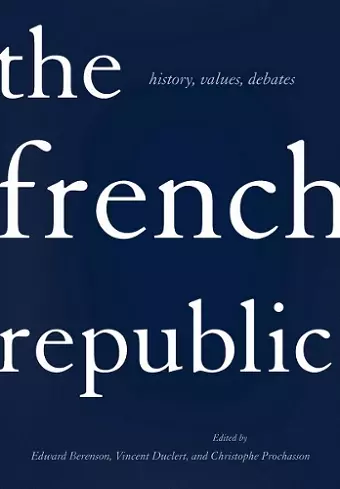The French Republic
History, Values, Debates
Edward G Berenson editor Vincent Duclert editor Christophe Prochasson editor
Format:Paperback
Publisher:Cornell University Press
Published:15th Jan '12
Currently unavailable, and unfortunately no date known when it will be back

In this invaluable reference work, the world's foremost authorities on France's political, social, cultural, and intellectual history explore the history and meaning of the French Republic and the challenges it has faced. Founded in 1792, the French Republic has been defined and redefined by a succession of regimes and institutions, a multiplicity of symbols, and a plurality of meanings, ideas, and values. Although constantly in flux, the Republic has nonetheless produced a set of core ideals and practices fundamental to modern France's political culture and democratic life.
Based on the influential Dictionnaire critique de la république, published in France in 2002, The French Republic provides an encyclopedic survey of French republicanism since the Enlightenment. Divided into three sections—Time and History, Principles and Values, and Dilemmas and Debates—The French Republic begins by examining each of France's five Republics and its two authoritarian interludes, the Second Empire and Vichy. It then offers thematic essays on such topics as Liberty, Equality, and Fraternity; laicity; citizenship; the press; immigration; decolonization; anti-Semitism; gender; the family; cultural policy; and the Muslim headscarf debates. Each essay includes a brief guide to further reading.
This volume features updated translations of some of the most important essays from the French edition, as well as twenty-two newly commissioned English-language essays, for a total of forty entries. Taken together, they provide a state-of-the art appraisal of French republicanism and its role in shaping contemporary France's public and private life.
[S]ome of the contributions are veritable masterclasses of synthesis. For example, the opening chapters on specific periods—especially those by Julian Jackson on Vichy and Martin Schain on the Fifth Republic—offer up refreshingly short and concentrated summaries of their respective topics. They are models of concision and would be ideal for confused undergraduate students....Herrick Chapman's sparkling chapter on 'The State' manages to raise some crucial questions about the relationship of the French people to their most cherished institution in a handful of pages; Jeremy Jennings deploys his considerable powers of synthesis in his lightning discussions of 'Liberty,' 'Equality' and 'Universalism;' Steven Englund offers a spirited rebuttal of the idea that the French were an anti-Semitic people in the early twentieth-century; and both Alice Conklin and John Bowen offer careful appraisals of 'The Civilizing Mission' and 'The Republic and the Veil' respectively. Again, these would all provide useful introductions for students, and they are a window into the extremely high quality of English-language historical work on France.
- Emile Chabal, Oxford University Press Journals (English Historical Review)The French Republic is an invaluable resource for historians of modern France. The thirty-eight essays, written by eminent scholars representing three countries and multiple intellectual traditions and generations, are of an uncommonly high quality. Although some are less tightly focused than others, the vast majority are clearly written, well-conceived, and authoritative, blending synthesis with fresh analysis. Because of the volume's unusual structure, the book ranges more widely than most edited collections and provides a great diversity of pieces that are nonetheless in dialogue with one another.
- Susan B. Whitney (Canadian Journal of History)French republicanism is often presented as unitary, centralized, and secular, and the various essays here examine how regional identities, feminism, immigration, and cultural difference have challenged the neo-Jacobin understanding of the 'one and indivisible' nation.... The essays arc brief but thorough, and each is accompanied by a list of suggested further readings, making this work an invaluable resource to students of French history. Summing up: Highly recommended.
(Choice)The original [French-language] volume was very much a 'critical dictionary,' with an original scholarly approach, but nonetheless something of the monumentality of many other dictionaries.... This volume—far slimmer, with its forty short essays—develops much further the questioning and critical nature of their approach. It is the more indispensable, indeed, for being lighter, brisker, and more plural in its deliberate attempt to solicit a range of often contradictory perspectives. In making this shift, the project has taken on new dynamism by deliberately setting out to offer a trans-Atlantic regard croisé, with Edward Berenson joining the editorial team and a range of American scholars, many of them among the most eminent in their fields, writing reflections as scholars of France (in some cases) or as scholars of Western social, political or intellectual history more generally.... The effect of this infusion of intellectual and cultural history by American authors is to underline what I think they had always sought to do: to provide a critical discussion of French republics, republicanism and republican culture.
- Julian Wright (H-France RevISBN: 9780801477843
Dimensions: 235mm x 155mm x 22mm
Weight: 907g
392 pages